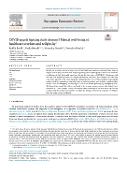COVID angels fighting daily demons? Mental well-being of healthcare workers and religiosity

Datum vydání
2024Publikováno v
European Economic ReviewRočník / Číslo vydání
162 (February 2024)ISBN / ISSN
ISSN: 0014-2921ISBN / ISSN
eISSN: 1873-572XInformace o financování
MSM//LX22NPO5101
Metadata
Zobrazit celý záznamKolekce
Tato publikace má vydavatelskou verzi s DOI 10.1016/j.euroecorev.2023.104649
Abstrakt
Relying on a unique survey of more than 15,000 healthcare workers conducted from June to August 2020 in Italy, we show that religious priming caused participants to have a less dramatic recollection of their distressful experience during the first wave of COVID-19. Consistent with the view that religiosity serves as a coping mechanism, this effect was stronger for those who were more exposed to the virus categories during the first wave of the pandemic (e.g hospital workers) and for respondents who faced more stressful situations, such as being reassigned due to the COVID-19 emergency, or working in a COVID-19-related specialty (e.g, emergency care). All things being equal, the effect was found to be stronger among nurses, who indeed were identified as "COVID angels"during the intense media campaign of the first wave. We find no evidence that the results are sensitive to either the timing of the survey response or distance from the main events recollected.
Klíčová slova
Healthcare workers, Mental well-being, COVID-19, Coping mechanisms, Religiosity
Trvalý odkaz
https://hdl.handle.net/20.500.14178/2672Licence
Licence pro užití plného textu výsledku: Creative Commons Uveďte původ 4.0 International






